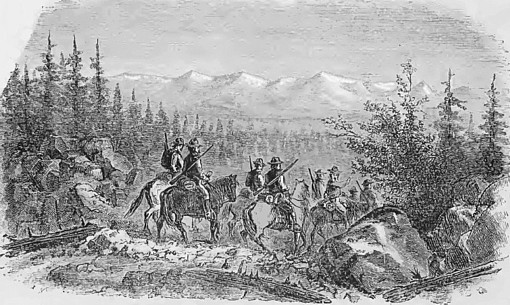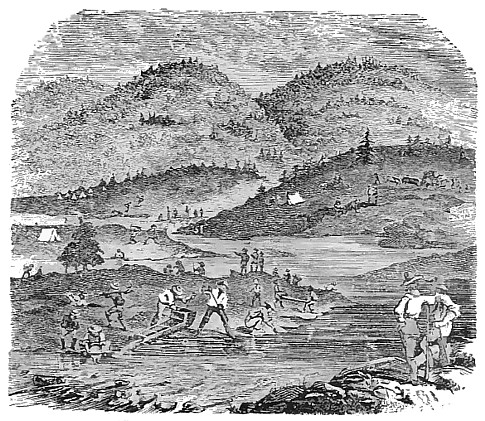At a place in California known as Coloma lived Peter Wimmer, who had married my father's sister. I always knew him as Uncle Peter. He had crossed the plains in about 1846, and afterward had remained at Sutter's fort. About the first of April, 1847, I received a letter from him which changed all my plans. Wimmer was the partner of James Marshall. In that letter he told me that, some time before, Captain Sutter had made a contract with him and J. W. Marshall, they agreeing to build for the captain a saw-mill at Coloma on the south fork of the American river.
Uncle Peter had four children, three boys and a little girl – all my cousins. While the mill-race was being dug, the children found it to be a place which they liked to play in, and one day, while thus playing, little John Wimmer, the second oldest boy, found a piece of gold of the value of about eight dollars. It was bright and pretty, and he ran to the house and showed it to his father and Marshall. It was washing day and, at Marshall's suggestion, the nugget was put into the wash-kettle among the boiling suds. After some little time it was found to be untarnished and Marshall said it must be gold, and he took it to Sutter's fort where it was tested and found to be truly gold.
While Marshall was gone to Sutter’s fort the little boys picked up about four ounces more of gold, so that when Captain Sutter came up to the saw-mill to see for himself, which he immediately did, Uncle Peter showed him this second discovery of the boys and satisfied him that a most valuable source of wealth had been found. Then Sutter and Marshall and Wimmer, calling the Coloma Indians together, entered into an agreement or lease with them, by which they leased from the Indians twelve miles square.
The Indians were to be paid in flour, meat, clothes, blankets, knives and ornaments, and the captain paid them at once for the coming year. Five men were working on the mill. I knew them well, their names were, Stevens, Brown, Barger, Johnson and Smith. They were Mormons. At any rate they had been in the Mormon battalion and they, of course, spread the news of this discover among the Mormons, producing great excitement among them as well as among the gentiles. The Mormons shortly found gold twenty miles down the river at "Mormon diggings," and were taking gold out in large quantities. All this and more was told me in uncle Peter's letter. I am aware that this discovery has been described in various ways. I here give its history, in substance, as Mr. Wimmer wrote it to me. It upset all my business plans. I caught the gold fever at once, and notified my wife and my partner, Joel, that it was time to give up livery stable keeping and go to the mines. My plan was not to dig but to make money by trading. It was arranged that Joel should take our horses and put them on pasture on Squire Elam Brown's rancho, near where Lafayette is now in Contra Costa county, while I should get a stock of goods suitable for a store or trading-post at the mines. Joel was a doubting Thomas, and did not understand how we were going to start a store with five hundred dollars, which was our whole money capital.
I was determined to try, and got Joel off with the horses. Then I went to Mr. Leidesdorff. When I had told him my plan he said that it was a good move, and directed me to go to the different stores and buy what I needed, and he would see the merchants and be responsible for it. He did so, and got me extensive credit. I bought my goods from Howard & Melius, Robert Parker, D. L. Ross, Davis & Grimes, and Dickson & Hay.
I laid in a necessary stock of groceries, flour, bacon, beans and liquors; also dry goods, shoes, boots, shovels, picks, tin pans, kettles of various kinds, and ammunition. My experience on the plains and in the mountains enabled me to choose just such a stock as a miner's camp would need. My purchases on that day amounted to four thousand five hundred dollars, for all of which Leidesdorff made himself responsible. Captain Sutter's launch had arrived from the Sacramento River, and next morning I had all my goods on board of her before Joel got back from Contra Costa. On his return we immediately sailed for our new field of adventure.
Arriving at Sacramento, we hired two ox teams to haul our goods to Coloma. On passing Sutter's fort we met Samuel Brannan. He wished me to stop at the fort and become his partner. He had just started a store there, and wished me to buy goods in San Francisco, while he would attend to selling them up there. He declared that we were sure to make a fortune in one year. I told him that I could not join him, being already in partnership with Joel. He said he had observed me to be an active businessman and to be trusted, and he needed just such a man as his partner. I could not do it, and we separated. In buying our goods at San Francisco I obtained them at fair wholesale prices, but little above the prices demanded before there was any word of the California gold discovery. When we sold them at the mines prices had gone up considerably. For example, we there sold flour at $1 per pound; sugar, 75 cts.; beans, 50 cts.; bacon, 75 cts.; coffee, $1.50; tea, $3; pilot bread, $1.25; dried beef, $1; whiskey, $8 per bottle; boots, $25 per pair, and coarse ones at that, as also were the shoes costing $12 per pair; common blankets, $32 per pair; picks, $16, that is, one ounce of gold; shovels, $16; tin pans, like milk pans, $8, and other articles in like price. It must be noted, however, that the prices very much increased when the great influx of miners came in, and those of many of the above articles became nearly doubled. The miners were getting plenty of gold, and they never questioned the prices, which we demanded for our goods. Provisions and supplies soon became scarce with the great incoming of miners, and they came to us to make purchases, with their buckskin sacks well lined with gold. The mines were very rich.
One day in August I suggested to Joel to go and try his luck at mining over on the middle fork of the American river. He went, found a very rich place, and returned that night with sixteen hundred dollars. Next day his claim was covered with miners, who jumped it while he was gone. He had neglected to observe a basic miner's rule, which provided that on absenting one's self from a claim, the miner must leave a tool in the hole as an evidence of ownership, or the claim could lawfully be taken over by another.
On the same day I also struck a rich mine. The Indians of whom there were many, came to our store wishing to buy scrapes. We had a bolt of cheap carpet, of rather gay colors, which just suited them. I cut off enough for one serape, made a hole in the middle of it, and put it on the chief. He was delighted and as proud as a peacock. The other Indians then made a rush to purchase more serapes. They had much fine gold that they carried in vulture or goose quills. They were not stingy; each Indian on getting his serape gave me all the gold that he had. When the carpet was all sold many more wanted serapes. I uselessly wished for another bolt. Just then my eye rested on a bolt of coarse pilot-cloth. From this I cut a serape, took from the chief the former serape and put the cloth one over his head. It took even better than the others, and I sold it all in the same way. When the Indians had gone I weighed the gold dust got from them, and found that those two bolts had brought us twelve hundred dollars. A very good day, that was!
The next day an odd thing happened. A jolly, good-natured miner came to the store with his buckskin sack full of much gold. He took a number of drinks of whisky during the day, made some purchases, among other things, a bottle full to take to his camp. The price was eight dollars a bottle! He shouldered his purchases, and went up the hill about two hundred yards, and there the drinks overcame him, and he lay down and fell asleep. His sleep was not to be undisturbed. Toward morning a big grizzly bear came to him, and with his paws rolled the man over, and continued rolling him down hill almost to the store. Then the bear went to the groceries and tore them all to pieces, and scattered them about. Just then I was going from my house to the store to open it at day dawn. At first I could not make out what the bear was doing, but on seeing me he ran away up the mountain, out of sight. On being aroused, the man said he had felt something pushing him about, but was too sleepy to mind it. I went with him up hill to his sleeping place. His rifle was leaning against the tree, but his fifty dollars' worth of groceries was entirely destroyed.


